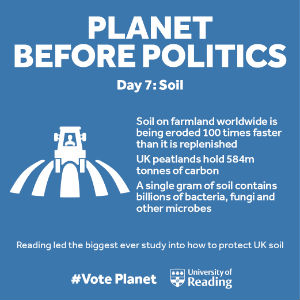#VotePlanet: ‘Let’s treasure our soil’ to help it cope with future threats
05 December 2019

Less disruptive farming techniques are vital to allow UK's soils and peatlands time to heal and fight climate change and flooding.
The Soil Security Programme (SSP), led by the University of Reading , is the largest research investment in soils for a decade, funded by the Natural Environment Research Council (NERC), Biotechnology and Biological Sciences Research Council (BBSRC), Scottish Government and Defra.
The findings of the five-year programme will be presented at the SSP Outcomes Meeting at the Royal Society in London on 5 December, which brings together the largest collection of UK soil scientists ever assembled. They will explain how breeding crops with hairier roots, reducing ploughing and supporting beneficial microbes can help protect soil to feed future generations.
They will also present brand new but inexpensive techniques developed by the team, such as using light reflectance to measure soil stability and satellites to identify degraded peatland.
Professor Chris Collins, Chair of Environmental Chemistry at the University of Reading and SSP Coordinator, said: "The need for understanding our soils has never been greater as the full extent of the environmental crisis is being revealed. Declining soil health is a major issue facing humanity globally.
"Healthy soil underpins countless vital services we rely on for food, clean water, climate and flood management. Yet, despite the huge importance of soil, we are bleeding it dry with intense farming methods .
"We need to stop taking our soils for granted and treasure them so they can recover. Managing threats like erosion and the loss of nutrients and biodiversity needs to be a top priority for governments around the globe."
The SSP investigated how healthier, better managed soils can help prevent increased flooding, reduce greenhouse gas emissions and store more carbon. It aimed to help our soil resist, recover and adapt to threats like erosion and damaging farming techniques.
The findings will improve forecasts of how soil responds to land use changes and how it can be better protected in areas where it is under threat.
The programme supported 18 research projects addressing: peatland restoration, root-soil interactions and farmland management. A report aimed at policymakers, land managers and the public has been produced for each of the three areas of research.
Recommendations from research by the SSP include:
- Peatland restoration
Peatlands are Britain's biggest carbon store and an vital part of the UK's commitments to curb climate change. Researchers found not draining cultivated peatlands in winter reduces the amount of carbon dioxide they emit without reducing yield. Planting cover crops e.g. rye during the winter can also prevent peatlands being damaged by rain and wind.
- Root-soil interactions
Healthy soil with good structure contains millions of different microbes and invertebrates, and the top 30cm forms the foundation for the entire food chain. The report recommends that crops should be bred to have hairier roots to hold together soil particles and create billions of air gaps under the surface that allow space for water and living creatures. The hairs also allow the crops to absorb nutrients, reducing fertiliser use.
- Managing farmland
Intensive farming damages the structure of soil, making it less able to hold water and microscopic life that benefits crops. The researchers found that minimising disturbance of the soil by ploughing less helps it replenish its organic matter and nutrients, produce more resilient microbes, store more carbon and prevent floods. They recommend growing grass mixtures for three years between crops as well as using a wider variety of crops to improve yields and soil structure, and promote beneficial microbes so land is more resilient to droughts and floods.
#VotePlanet
The University of Reading's #VotePlanet campaign is highlighting the biggest threats facing the UK and global environment, as well as how research and action can combat them, in the lead up to the General Election on December 12.
Public concern for the environment has increased significantly in recent years, with political parties unveiling various eco-friendly pledges in their election manifestos.
The #VotePlanet campaign therefore aims to inform voters on the science behind these issues, and what sustainability action it is taking as an institution.
Follow the campaign on Twitter, Facebook and Instagram, and on the University news page. Get involved and share your examples of sustainable action using the hashtag #VotePlanet.
